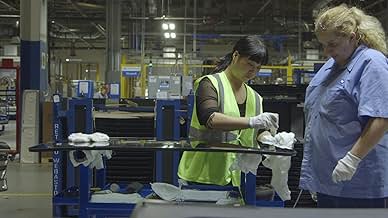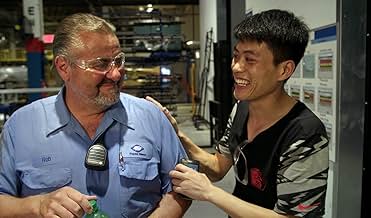Fin 2008, une usine ferme dans l'Ohio. En 2014, un milliardaire chinois la rachète et investit dans la production de vitres pour l'automobile. L'usine compte 2000 employés en 2014. Les USA r... Tout lireFin 2008, une usine ferme dans l'Ohio. En 2014, un milliardaire chinois la rachète et investit dans la production de vitres pour l'automobile. L'usine compte 2000 employés en 2014. Les USA rencontrent la République populaire de Chine.Fin 2008, une usine ferme dans l'Ohio. En 2014, un milliardaire chinois la rachète et investit dans la production de vitres pour l'automobile. L'usine compte 2000 employés en 2014. Les USA rencontrent la République populaire de Chine.
- Réalisation
- Casting principal
- Récompensé par 1 Oscar
- 19 victoires et 50 nominations au total
- Self - Furnace Off-Loader
- (as Bobby)
Avis à la une
I think for the most of the film you will be asking yourself a question where is all of this going, the answer is out there and it is quite broad.
One of the most shocking moments is the reveal of Chinese work culture. Workers are literally robots, they have numbers, they don't waste any time, they work 16 hours a day 26 days a month non stop.
In China, the corporation you work for is glorified to the point that you start to feel like you are part of a cult rather than a company that is simply making profit.
While it might be normal for China that there are small kids dancing, weddings happening and corporate bosses praised during one of the company celebrations, personally to me this looked surreal to the point of crazy.
For me the job is just a job, it's there because you need to make money, everything else is big bosses making big bucks off your back, nothing less nothing more, for chinese it's a cult.
Now I don't know if the goal of the globalization is to make everyone work like in China, but if it is, then everyone, literally everyone is in deep trouble, especially the biosphere of our planet ...
At the Q&A at the premiere at IFC Center, co-director Julia Reichert was at pains to stress that the film was never meant to be polemical, that this was an effort to immerse and learn. While some of the silllier aspects of both cultures, (but especially the regimented and self-congratulatory aspects of the Chinese). come through with particular acuity, you can't help buy muse on how Americans have acted with equal tin-earedness and cultural arrogance around the world, over many more decades than the Chinese have been at this game.
At the same time, America's neediness of manufacturing jobs, even if they don't pay a living wage, and the ways that so many of what we would normally consider our core values go out the window to accommodate anyone who will invest in them, come through particularly clearly. This all comes together in a fight over the establishment of a union that would protect workers' rights and uphold our eroding safety and environmental standards that is the vivid core of the movie.
A final note: This film has an extraordinarily compelling musical score by someone names Chad Cannon that propels and highlights the narrative and is amazingly effective on its own terms. Although the idiom is different, Cannon's score does for this film much of what Philip Glass's have done over the years for the films of Errol Morris, and that is high praise indeed.
However, this is a fine piece of work.
It tells the story of a Chinese windscreen-manufacturer reseeding the site of a massive General Motors factory in Dayton Ohio some three years after its closure.
The main premise of the film is that this is a meeting of two cultures, both business and anthropological, and how the rise in Chinese commercial enterprise, even deep in rust-belt, Republican USA, is a success that won't go away.
But the Chinese drive a hard bargain: much lower wages, poorer health and safety ideology, an intolerance of unions and a hard work ethic (in China overtime is compulsory, not optional).
The filmmakers - Stephen Bognar and Julia Rheichert - are seasoned pros and have an interesting technique that makes this such an agreeable watch. It's not controversial, there's little humour and there are no pyrotechnics. It's just a laconic stroll through the lives of the people on both sides of this cultural ravine, gradually exposing what it's like for each of them.
They take no sides, they critique no-one, but clearly there is stuff in here that could enrage a very large percentage of its viewers, no matter their cultural persuasion.
That's what makes it work. That and a good soundtrack and a pleasing use of cinematography.
It's not doc of the year, for me, but it IS an intelligent piece of documentary film-making that is as far from the Michael Moore one-sided tidal-wave of opinion and argument as one could get, and, for that, it is to be admired.
The Chinese management team that comes in doesn't always care about safety or the environment, but they're brutally efficient and drill their workers like an army or Communist party members, the latter of which is ironic, since the workers are so far from the ideals of communism, e.g. having real power and sharing the wealth of their labor. Meanwhile, one seriously wonders whether Americans can compete in this space, having been "spoiled" by prosperity and earlier times when they made a decent salary. You know, how dare they want a good work/life balance!
Where the documentary falls short is in not showing us the treatment of these workers under the American company beforehand; it really could have used a one hour segment on that. If it had taken the time to do so, we would have seen the same problematic behavior from American corporate executives squeezing every last drop out of their workers for the sake of the bottom line, ultimately leading to outsourcing manufacturing to overseas workers forced to work long hours, often away from their families.
The only effective means of worker power is through unionizing, and both Chinese and American executives resist it mightily, using pages from the exact same playbook, like targeting leaders and paying for propaganda campaigns. In a sense, the American executives going overseas was like finding a pool of scabs to cross the picket line. As one of the state congressmen observes in speaking to the workers, corporate profitability and treating workers respectfully via a living wage are not incompatible things, and it's shameful that they're treated that way out of unfettered greed in extreme capitalism. (Hmm, if only there was an international labor organization, lol)
It seems to me it's a system that spirals upon itself further - when you distribute the wealth so incredibly unfairly in a country, the vast majority of consumers can't afford to pay the premium for a product that was made by unionized hands. They often don't have the economic freedom to do that, or to do things like shop at a mom 'n' pop shop instead of some corporate goliath like Wal-Mart, because they're living paycheck to paycheck and every penny matters. The result is to further drive the system in the direction it's going. Suddenly the middle-class starts dwindling and people are hoping more for a miracle ala the lottery than thinking they can truly make it. The documentary doesn't mention any of this so I'm guilty of rambling on here, but it did make me think.
The ending sequence is sobering as well, showing management practically salivating over robotics taking the place of workers - you know, those pesky things on the payroll that do all of that complaining, sometimes get sick or pregnant, etc. Hey, we can drive costs down by just replacing them with machines! It's too bad no one asks any of the executives the difficult moral questions, like what the right thing to do is, or how they justify their behavior. Overall though, well done, and pretty chilling stuff.
Le saviez-vous
- AnecdotesDirectors Steven Bognar and Julia Reichert previously worked on the short documentary The Last Truck: Closing of a GM Plant (2009). It is about how the plant was shut down by General Motors, a topic in this movie.
- Citations
Himself - Fuyao Safety Director: Everybody at every level will say that we really, really want to be safe. But safety doesn't pay the bills.
- ConnexionsFeatured in The Oscars (2020)
Meilleurs choix
- How long is American Factory?Alimenté par Alexa
Détails
- Durée1 heure 50 minutes
- Couleur
- Mixage
- Rapport de forme
- 1.78 : 1
- 1.85 : 1
Contribuer à cette page

































